The Irrawaddy Magazine |
- President’s Office Calls Out Media Company For Alleged Govt Bribe
- Tens of Displaced People Dead Or Missing After Boat Accident
- UNFC Makes Plans To Hold Peace Talks With New Govt
- Popular Messaging Service Viber To Strengthen Privacy Features
- The Art of Making Thanakha
- Suu Kyi Talks ‘Peace’ On Burmese New Year; Ethnic Leaders Respond
- Japan PM Abe Unlikely to Call Snap Election Due to Quakes
- Malaysia Faces Bailout Question After US$1 Billion Spat
| President’s Office Calls Out Media Company For Alleged Govt Bribe Posted: 20 Apr 2016 06:43 AM PDT  SkyNet Pavilion in Naypyidaw during the Thingyan New Year water festival in mid-April 2016. (Photo: Htet Naing Zaw / The Irrawaddy) RANGOON — Burma's President's Office sent a warning on Wednesday to a media company who they allege gave a large monetary gift to a government official during Burma's Thingyan festival last week. The statement released by the office reported that a media company took part in the annual Thingyan New Year water festival in Naypyidaw by staging a pavilion and inviting ministerial officials to the performances that followed. The announcement did not mention the media company's name. "Among them was a personal assistant of a 'VIP' who was given a package filled with five million kyats as present [by the media company]," the statement said. It added that the individual later found the money upon inspection and complained about it to his senior officer. President's Office Minister Aung San Suu Kyi released guidelines on gifts for civil servants on April 4, barring any government employee from accepting anything worth more than 25,000 kyats, or just over US$20, in an attempt to fight against rampant corruption in the country. "What the media company gave exceeded the amount mentioned in the guidelines. We have informed the media company not to violate the guidelines when giving gifts in the future," said the statement. It also mentioned that the President's Office "would not take action this time" and would instead treat the incident as "an educational moment." When asked to name the company, President's Office spokesperson Zaw Htay told The Irrawaddy on Wednesday afternoon that they had refrained from identifying the business, as they did not want to cause a "frenzy," and that they have not yet received a response from the group in question. "If you read the statement thoroughly, you will know," he suggested. Although they are not explicitly named, at the time of reporting, it appeared that the private TV operator SkyNet was the sole media company to stage a pavilion in Naypyidaw during the 2016 Thingyan celebrations. Soon after the statement was posted on the President's Office Facebook page, users also openly speculated that the unnamed company was, in fact, SkyNet. "SkyNet, you should stop this lowly way of thinking that money can bring you everything," one commenter wrote. SkyNet is part of Shwe Than Lwin Media Co. Ltd. and is chaired by Kyaw Win, who is believed to have close business ties with the former government and the ex-military regime. The company was not available for immediate comment on Wednesday. The President's Office statement said that the five million kyats (US$4,250) given to the official will be donated to the Social Welfare, Relief and Resettlement Ministry to contribute to water projects being implemented in drought-hit areas this summer. The post President's Office Calls Out Media Company For Alleged Govt Bribe appeared first on The Irrawaddy. |
| Tens of Displaced People Dead Or Missing After Boat Accident Posted: 20 Apr 2016 04:46 AM PDT  Villagers watch a rescue mission near Thae Chaung IDP camp in Arakan State after a boat capsized off the coast there on Tuesday. (Photo: Jack Sadak / Facebook) RANGOON – Police officers have confirmed that a boat which capsized on Tuesday off the coast of Thae Chaung village, near the Arakan State capital of Sittwe, has left 18 dead and 19 survivors. Aye Khin Maung, a police officer in Sittwe, told The Irrawaddy that the boat had departed from Sintatmaw, an internally displaced people's (IDP) camp in Pauktaw Township. It was headed toward Sittwe, where those on board had hoped to purchase commodities before the rainy season, when travel becomes more difficult. He described the passengers as "Bengali," a term frequently used by local and government officials to label Arakan State's Rohingya minority, who are denied Burmese citizenship. According to Aye Khin Maung, the known casualties of the accident—caused by unexpectedly large waves—included 10 children, seven women and one man. Local authorities are still attempting to locate missing people; he said that the boat held a total of 49 passengers, 12 of whom remain unaccounted for. There have been discrepancies between the reports made by local authorities and the information given by residents of the area, leading to conflicting details about who was on board. Hla Win, 54, an ethnic Kaman Muslim in the Thae Chaung camp, told The Irrawaddy that as of Wednesday, 22 bodies had been discovered since the boating accident. He confirmed that the victims were mostly women and children, but estimated that the boat had held not 49 passengers, but up to 75 people. Of these, he said half are still missing. For those confirmed dead, Hla Win laments some of the deaths as preventable, had there been a better health care infrastructure in the area. "Some people died on the way to the hospital because we had to ride almost one hour from Thae Chaung to Sittwe," Hla Win said. "If we'd had emergency nursing care, we could have saved their lives." Police officer Aye Khin Maung added that there were reportedly no life jackets on the boat, which may have contributed to the high casualty rate. Hla Win also claimed that the passengers were ethnic Kaman, rather than Rohingya, a statement which police officer Aye Khin Maung denied. "As far as I know, there were no Kaman on the boat," he said. While both the Kaman and the Rohingya are Muslim minorities were displaced by ethno-religious violence which broke out in Arakan State in 2012, the Kaman are designated as one of the national, indigenous groups of Burma; the Rohingya are denied any documentation in the country. In Arakan State, displaced people generally live under police surveillance and must seek official permission from the authorities to travel outside of the camps. In this case, Aye Khin Maung declined to comment on whether the passengers on the boat had received permission to leave the camp and go to the Sittwe market. At the time of reporting, The Irrawaddy could not reach the camp's security guards for further information on the issue. The post Tens of Displaced People Dead Or Missing After Boat Accident appeared first on The Irrawaddy. |
| UNFC Makes Plans To Hold Peace Talks With New Govt Posted: 20 Apr 2016 04:19 AM PDT  UNFC meeting in Chiang Mai, Thailand. (Photo: Kyaw Kha / The Irrawaddy) The United Nationalities Federal Council (UNFC), an alliance of nine ethnic armed groups, is taking steps toward holding peace talks with President Htin Kyaw's government. The meeting of current UNFC members, who opted out of the so-called Nationwide Ceasefire Agreement (NCA) with the previous government in October 2015, began Tuesday in Chiang Mai and focused on future plans, including negotiations with the new government. "We've heard somewhat about the standpoint of the new government. So we guess there will be a political dialogue soon. We are preparing, through this meeting, for additional discussion of a nationwide ceasefire," UNFC vice chairperson Nai Hong Sar told journalists. The three-day meeting will reportedly focus on the latest actions of a negotiation group that was formed by the UNFC in an attempt to quell conflict between the Restoration Council of Shan State/Shan State Army-South (RCSS/SSA-S) and the Ta'ang National Liberation Army/Palaung State Liberation Front (TNLA/PSLF). Thousands of internally displaced persons in Shan State, particularly in Kyaukme Township, have fled recent fighting between the two sides, who split over the signing of the agreement; the RCSS is a signatory, while the TNLA is not. Clashes between the two groups first erupted in late November and have persisted in the months since. Additionally, the meeting will focus on progress in the merger between the United League for Arakan/Arakan Army (ULA/AA) as well as the political framework drafted by the former President Thein Sein's government and the eight ethnic armed groups that signed the NCA. UNFC members welcomed Aung San Suu Kyi's speech delivered on the occasion of the Burmese New Year, in which she promised to build a genuine, democratic federal union, seeing it as an auspicious sign for peace talks. Translated by Thet Ko Ko. The post UNFC Makes Plans To Hold Peace Talks With New Govt appeared first on The Irrawaddy. |
| Popular Messaging Service Viber To Strengthen Privacy Features Posted: 20 Apr 2016 04:12 AM PDT  Workers use their mobile phone in a vehicle on their way home in Rangoon on January 18, 2013. (Photo: Soe Zeya Tun / Reuters) The popular messaging service Viber announced the launch of new features that will offer strengthened security and privacy control to its users. One of the most widespread mobile communication applications in Burma, the number of Viber users in Burma reached 18 million in December of 2015—up from five million in July of the previous year. In the coming weeks, Viber said they would offer end-to-end encryption, which will advance security and privacy by encrypting messages, photos, videos and voice recordings while these communications are sent from one device to the intended recipient. The new feature will also introduce "Hidden Chats" allowing users to conceal specific chats from the main screen. "We take our users' security and privacy very seriously, and it's critical to us that they feel confident and protected when using Viber," said Michael Shmilov, Viber's Chief Operating Officer, quoted in the press release. In Burma's commercial capital, Rangoon traffic police also use Viber to take immediate action against the drivers who break traffic rules, by accepting complaints from users via message, photo and video. The post Popular Messaging Service Viber To Strengthen Privacy Features appeared first on The Irrawaddy. |
| Posted: 20 Apr 2016 02:26 AM PDT 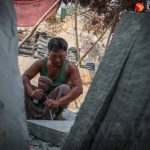 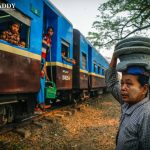 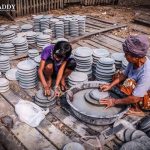 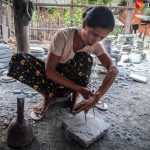 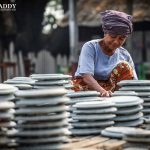 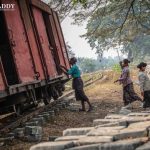 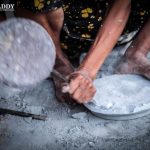 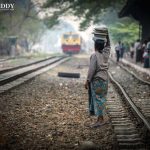 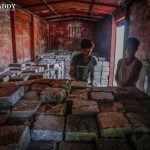 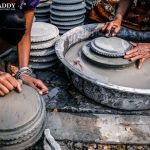 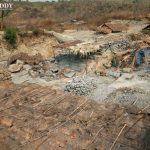 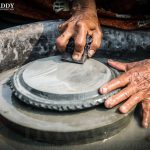 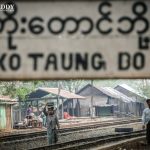 Thanakha is a fragrant paste traditionally used by Burmese for cosmetic and medicinal purposes. It is made by grinding the bark or root of a Thanakha tree (typically, a Limonia acidissima tree) on a flat, circular stone known as kyauk pyin, designed specifically for this purpose. Indeed, Thanakha is nothing without a kyauk pyin. Lying next to the stretch of the Mandalay-Myitkyina railway line that passes through Sagaing Division's Kantbalu Township is Ko Taung Bo village, one of Burma's main suppliers of kyauk pyin. Most of the villagers make a living by extracting stone slabs, often in very simple ways, from a mountain approximately 2.5 miles from the village. Upon extraction, they either refine the stones into kyauk pyin to sell at the Ko Thaung Bo railway station or they send the slabs to other areas across Burma for refinement and, eventually, distribution. The post The Art of Making Thanakha appeared first on The Irrawaddy. |
| Suu Kyi Talks ‘Peace’ On Burmese New Year; Ethnic Leaders Respond Posted: 20 Apr 2016 01:55 AM PDT  Nai Hong Sar of the NMSP, Bawmwang Laraw of the KNO and Khu Oo Reh of the KNPP. (Photo: The Irrawaddy) Aung San Suu Kyi, the de facto leader of Burma, highlighted internal peace and constitutional change in her speech to the people on the Burmese New Year. In reference to the 2015 nationwide ceasefire agreement (NCA), she said she appreciated the initiative undertaken by the previous government and that she would strive to include in the accord the organizations that her National League for Democracy-led (NLD) government deem appropriate for inclusion. Under the former administration, only eight—out of the country's more than 20 non-state armed groups—signed the NCA; some organizations were excluded outright from becoming signatories. Through peace conferences, Suu Kyi said her government would strive to build a "genuine federal democratic union" and that the military-drafted 2008 Constitution needs to be amended for this to be achieved. This process of constitutional change would not adversely affect Burma's people, she promised. The Irrawaddy's Kyaw Kha spoke with three leaders belonging to ethnic nationalities or organizations that opted out of signing the NCA for its lack of inclusivity. In the commentary below, they explain their reactions to Suu Kyi's speech and their expectations for renewing Burma's peace process under an NLD administration.  Nai Hong Sar, vice-chairman of the New Mon State Party. (Photo: The Irrawaddy) Nai Hong Sar, Vice-Chairman of the New Mon State Party (NMSP) We share almost the same view. Therefore I guess there will be progress [in the peace process]. Again, we found that [the NLD's] standpoint is to push wherever possible, for example, with the release of political prisoners. Political prisoners were released with a presidential pardon. [The new government] was brave to exercise their mandate to do what they felt they should do and we view it as a positive sign. Again, [Suu Kyi] pointed out an inclusive ceasefire and the inclusion of all ethnic armed groups in a political dialogue. This is critically important. And it is strongly in agreement with our standpoint. How much can they exert influence over the military to push for [a ceasefire]? For us, we really want [a ceasefire]—we've been demanding it. If they [the NLD government] could convince the military, I believe [a ceasefire] would be done at the soonest.  Bawmwang Laraw, chairman of the Kachin National Organization. (Photo: The Irrawaddy) Bawmwang Laraw, Chairman of the Kachin National Organization (KNO) I welcome Daw Aung San Suu Kyi's speech. I share her view: nationwide peace must be built. Regarding the constitutional amendments, I think we need to sign a new ceasefire accord because the previous peace accord did not include provisions that provide changes to the 2008 Constitution. Therefore provisions that allow constitutional changes must be discussed and included in the peace pact. This is the way peace process should be implemented. We need to make sure it is all-inclusive if we are to create a nationwide ceasefire. [The NLD government] needs to seek guarantees for peace in implementing its nation-building policies. It is the right path for the new government, led by Daw Aung San Suu Kyi, to strive for a ceasefire and to amend the constitution, because the 2008 Constitution is an obstacle to a federal union. To put it in a nutshell, I support and welcome [Suu Kyi 's plan to] build peace through a ceasefire and to talk with ethnic armed groups. I am very glad that Daw Aung San Suu Kyi has announced that she will amend the constitution through such talks and build our country into a federal union.  Khu Oo Reh, vice-chairman of the Karenni National Progressive Party. (Photo: The Irrawaddy) Khu Oo Reh, Vice-Chairman of the Karenni National Progressive Party (KNPP) This is what everyone is expecting, I think. We've been working for national reconciliation and peace since the time of the previous government. And we are glad that the NLD government is giving top priority to national reconciliation and peace. We hope that they will implement it as quickly as they can. Daw Aung San Suu Kyi said that reconciliation needs to be built among all groups, as well as between people and the military. So, I think her view is not so different from ours. For example, [reconciliation] can be between political parties, as well as between the military and ethnic armed groups or between ethnic armed groups themselves. It also can be reconciliation between ethnicities. In our country, groups and parties are divided in different ways, so I accept reconciliation under such circumstances and consider it necessary. Public trust [in the government] has declined steadily since the military staged a coup. People have always been oppressed and therefore feel bitter. So, reconciliation is really needed between the military and the people. I think it is a dire need. Only after reconciliation is built between different groups and parties will we be able to proceed with the peace process that we want. Trust is at the core of building reconciliation. Trust needs to be built first. Only when there is trust between each individual and each group, can the negotiation process of how to build peace together be smooth, I think. It is crucial. I view what the State Counselor said about the peace process in her speech as a clear message to us. At the same time, it is informing the entire public. In my understanding, she has said that each citizen is responsible for taking part actively in national reconciliation and the peace process. Translated by Thet Ko Ko. The post Suu Kyi Talks 'Peace' On Burmese New Year; Ethnic Leaders Respond appeared first on The Irrawaddy. |
| Japan PM Abe Unlikely to Call Snap Election Due to Quakes Posted: 19 Apr 2016 10:40 PM PDT  Japan's Prime Minister Shinzo Abe (center) speaks to reporters after a meeting of the earthquake emergency disaster response team in Tokyo, Japan, April 15, 2016. (Photo: Kyodo / Reuters) Japanese Prime Minister Shinzo Abe is unlikely to call a snap election after deadly earthquakes on the southern Kyushu island and may postpone ratification of the Trans-Pacific Partnership (TPP) trade agreement until the next session of parliament, the Sankei newspaper reported Wednesday. Speculation had grown that Abe may dissolve parliament's lower house and call an election on the same day as an upper house poll is due in July. But Sankei said a double election would put a burden on quake-hit local municipals as they seek to reconstruct their economies and put the lives of victims back in order. A series of Japanese quakes measuring up to 7.3 hit Kyushu last week killing 44 people. More than 94,000 people remained in evacuation centers, cut off from the world by destroyed roads. Because of the quakes, the government's ruling coalition was expected to postpone ratification of the TPP trade agreement in the current parliament which ends June 1, the report said. The TPP was not expected to be ratified soon. Abe is expected to announce a final decision on a sales tax hike planned next April around the time of a May 26-27 Group of Seven summit that he will host. The premier was already expected to delay the tax increase even before the deadly quakes, which some private economists said now make the postponement even more likely. Abe said this week that he would stick to the tax plan, barring a financial crisis or a major natural disaster. Separately, Tomomi Inada, the policy chief of the ruling Liberal Democratic Party said that the government could consider raising the sales tax one percentage point at a time if the economy was not strong enough to endure a bigger rise, the Nikkei business daily reported. The post Japan PM Abe Unlikely to Call Snap Election Due to Quakes appeared first on The Irrawaddy. |
| Malaysia Faces Bailout Question After US$1 Billion Spat Posted: 19 Apr 2016 10:19 PM PDT  A man walks past a 1 Malaysia Development Berhad (1MDB) billboard at the funds flagship Tun Razak Exchange development in Kuala Lumpur, March 1, 2015. (Photo: Olivia Harris / Reuters) The Malaysian government on Tuesday was facing the prospect of having to bail out the scandal-tainted state fund 1MDB, after a US$4.6 billion debt deal with an Abu Dhabi sovereign fund collapsed this week. The International Petroleum Investment Company (IPIC) said on Monday that 1Malaysia Development Berhad's (1MDB) had failed to make a $1.1 billion payment, and so was terminating last June's debt deal. "The government wouldn't want to risk having a default on its books, so if it came down to it, they would want to keep a clean record," said Krystal Tan, a Singapore-based economist at research firm Capital Economics, talking about risk of a bailout for 1MDB. Any government intervention would pile more pressure on Prime Minister Najib Razak, who founded 1MDB and is on its advisory board. He has faced calls to step down over allegations of graft and mismanagement at the fund. "Its [agreement with IPIC] failure not only now places 1MDB itself at risk, but now involves a bailout by the Ministry of Finance," opposition leader Tony Pua said in a statement. The Malaysian finance ministry is the sole shareholder of 1MDB. "He [Najib] must explain how is 1MDB going to fund the immediate repayment of $1.1 billion demanded by IPIC." The credit market is pricing in the uncertainty. Malaysia's Credit Default Swaps, the cost of insuring against default, has been underperforming the broad market since Monday. The 5-year contract jumped by 10 basis points on Tuesday and has risen about 15 basis points since IPIC's announcement. Cross-Default Fears The Malaysian government will have to come to 1MDB's aid, said a senior politician with the ruling United Malays National Organisation (UMNO), who did not want to be identified. The UAE's termination of the $4.6 billion deal with 1MDB "poses an issue of cross-default," he said. Cross-default is a provision in a bond or loan agreement that puts borrowers in default if they default on another obligation. Malaysia has total overseas debts of $98 billion, of which $47 billion is held by the central bank and the government, according to Thomson Reuters data. The Malaysian government is currently in the midst of raising a $1.2 billion sovereign Islamic bond. The ministry of finance said in a statement it would "continue to honor all of its outstanding commitments". One of 1MDB's last major outstanding liabilities is a $3 billion bond, arranged by Goldman Sachs, which carries a letter of support from the federal government. The fund, launched by Prime Minister Najib Razak in 2009, amassed over 50 billion ringgit in debt buying energy and real estate assets through projects with companies in Saudi Arabia, the UAE and other Gulf countries. It sold off most of these assets to state-owned Chinese companies late last year. "It is difficult to accurately ascertain the exact level of debt that 1MDB has now following the successful sale of various assets," said Chia Shuhui, Asia Analyst for BMI Research. Regardless of the amount, a government bailout of the fund "will have a negative impact on the government's fiscal position", he said. Oil exporter Malaysia is aiming to keep its fiscal deficit, already under pressure from slower growth and lower crude prices, at 3.1 percent of gross domestic product. Offshore Accounts 1MDB is at the center of money-laundering and criminal investigations in the United States, Switzerland, Singapore and Luxembourg. A Malaysian parliament inquiry found that billions of dollars had been sent to offshore accounts without the approval of its board. One of those offshore accounts was for a company called Aabar Investments PJS Ltd in the British Virgin Islands, which received payments of $3.5 billion from 1MDB that were meant for IPIC. The Abu Dhabi fund said Aabar Invesments did not belong to it. Najib has been under pressure to step down after reports claimed that $681 million, deposited into his personal bank account, came from 1MDB. A government-appointed Attorney General cleared Najib of any criminal offence or corruption, and said the money was a donation from the Saudi royal family. Saudi Foreign Minister Adel Al-Jubeir said last week the funds wired into Najib's personal bank account were a "genuine" donation originating from Saudi Arabia. The post Malaysia Faces Bailout Question After US$1 Billion Spat appeared first on The Irrawaddy. |
| You are subscribed to email updates from The Irrawaddy. To stop receiving these emails, you may unsubscribe now. | Email delivery powered by Google |
| Google Inc., 1600 Amphitheatre Parkway, Mountain View, CA 94043, United States | |




